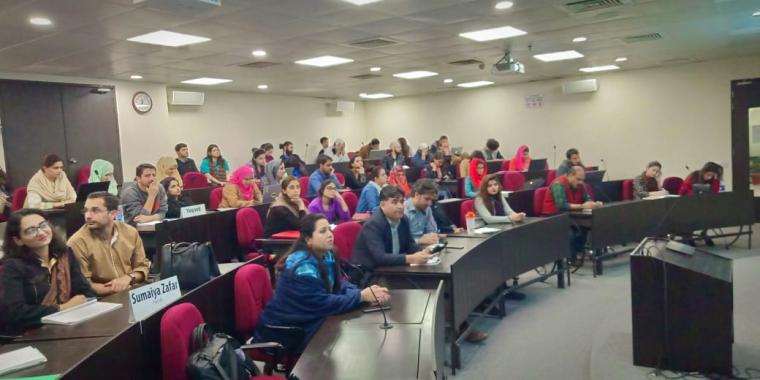
Dr. Emmanuel Jimenez discussed the challenges and opportunities in the generation and use of Impact Evaluations (IE) and Systematic Reviews in Development, at a video session held at the Syed Ahsan Ali and Syed Maratib Ali School of Education (SOE) on March 14, 2019.
Dr. Emmanuel Jimenez is the Executive Director at the International Initiative for Impact Evaluation (3ie). Having previously worked at the World Bank Group for 30 years, he has provided technical expertise and strategic leadership in a number of research and operational positions. He was earlier the director of public sector evaluations at the Independent Evaluation Group of the World Bank. Prior to this position, he was responsible for the bank’s operational programme in human development in Asia. Dr. Jimenez has published numerous monographs and scholarly articles in the fields of education, social protection, labour, health, urban development, public finance, environment and population.
Dr. Jimenez also led the core team that prepared the World Development Report 2007: Development and the Next Generation and was editor of the journal, The World Bank Research Observer. He is currently the editor of the Journal of Development Effectiveness. Dr. Jimenez has completed his PhD from Brown University and was an Associate Professor in the Economics Department at The University Of Western Ontario, Canada. He has also served on the World Economic Forum’s Global Agenda Council on Population Growth.
In his talk, Dr. Emmanuel talked about the contribution of the International Initiative for Impact Evaluation (3ie) in the generation and use of evidence for global decision-making. The 3ie provides support to evaluations and reviews in low and middle-income countries. It aims to build and facilitate networks of evaluations to improve capacity and commitment to generate and use evidence in decision-making. Furthermore, it provides global access to knowledge products, to policymakers, programme managers, researchers, civil society, media and donors.
Dr. Jimenez discussed the global trends in IE and Syntheses, with a dramatic increase in the number of IE studies and Systematic Reviews primarily in the areas of Health, Education, Social Protection and Agriculture. According to him, the challenge posed here is the uneven geographic and thematic coverage of these studies as a result of which a knowledge gap seems to persist.
Another significant challenge highlighted by Dr. Jimenez is the lack of practical implementation of the evidence generated through the IE projects. Hence, there continues to be a usage gap due to the complexities and stakeholder groups involved in policymaking and practical interventions.
The session also focused on the ways in which these challenges can be addressed. Dr. Jimenez discussed the importance of generating evidence based on the right questions for the use of policymakers. The key idea is to identify existing gaps in knowledge and work on bridging these gaps, hence improving the relevance of the IE. He also placed great emphasis on employing multiple methods to address policy-relevant questions.
The talk ended with a Question and Answer session wherein the relevance and future prospects of IE projects in the context of Pakistan, with its unique sets of opportunities and challenges, were discussed.








